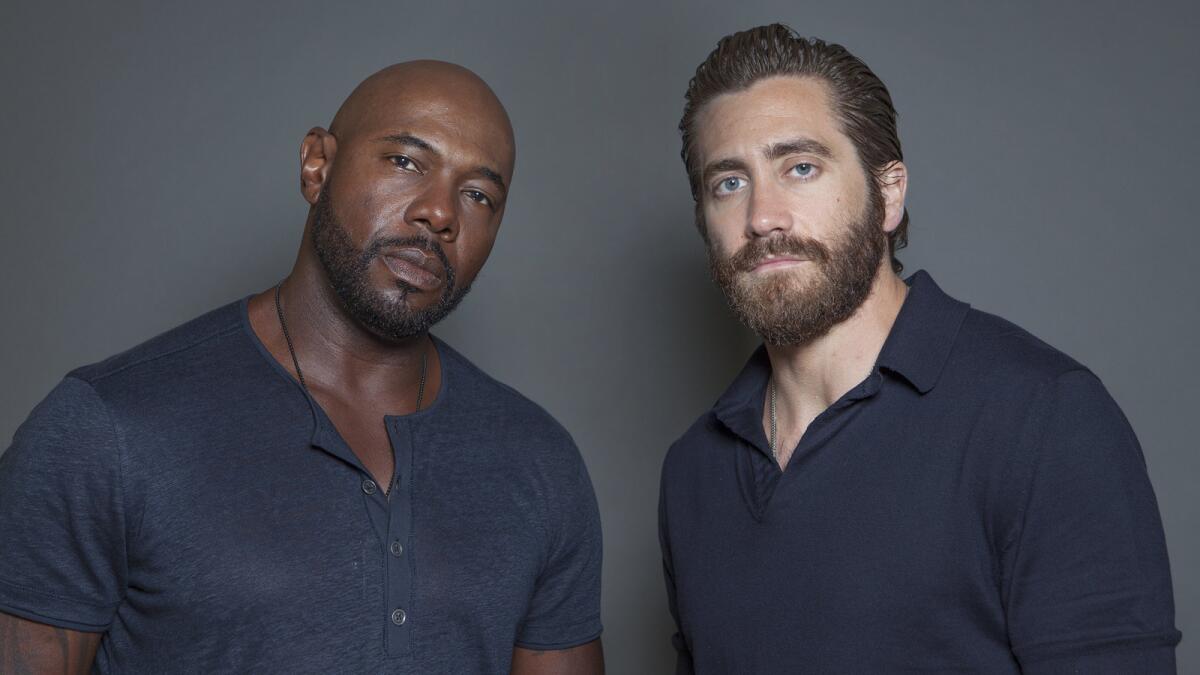For ‘Southpaw’ director Antoine Fuqua, a different kind of bout

Antoine Fuqua, left, and Jake Gyllenhaal pose for a portrait at the Four Seasons Hotel in Los Angeles.
- Share via
The new drama “Southpaw” would seem to come in a long tradition of boxing movies and underdog sports films generally. But ask director Antoine Fuqua what he sees as the throughline in this weekend’s release, and he has a slightly different answer.
“I didn’t really see it as a boxing movie -- I saw it about a man who’s grieving and has to learn to be a father,” Fuqua said in a phone interview.
The Weinstein Co. film stars Jake Gyllenhaal as Billy Hope, a prizefighter who at the start of the film has it all but sees his life upended when his wife (Rachel McAdams) is accidentally killed during a spat between Hope and another boxer that turns violent.
That sends the hero down a spiral of misfortune, which includes losing his money and custody of his daughter. He has to train for a bout that could earn him back what he lost, but to do that he must learn a new, more disciplined method of fighting that stands in contrast to his more all-out approach.
“Southpaw” features numerous sequences set in the ring. Fuqua wanted them to play as they would in real life, so he and cinematographer Maurio Fiore attempted to stage them to look like real fights, even employing HBO camera operators to shoot those scenes,
“I wanted it to feel real, not over the shoulder,” said Fuqua, an avid boxer himself, as he spoke from the set of his “Magnificent Seven” remake in Louisiana.
“I grew up with ‘Rocky’ and loved it; when I hear that song I want to go running,” he continued. “And then Scorsese and ‘Mean Streets’ and all these other movies. But I don’t know of any movies that tried to do [the authentic shooting] we tried to do here.”
(Grittiness has its limits, though, particularly when it came to the ending, a narrative choice that involved some substantive discussions between the director and Weinstein executives -- more on that after the weekend.)
“Southpaw” arrived at Weinstein after a long development process with multiple studios. Originally packaged with Eminem, the film morphed (and was delayed) when the rapper left to focus on his music. (He still contributed some songs.)
The Eminem version might have resonated differently — a semi-autobiographical “8 Miles”-ish story of a man who has had similar struggles instead of the story of actorly transformation that the Gyllenhaal version has become.
Still, Fuqua said that the star found his own angle, particularly via coiled intensity. Asked if that intensity was an on- or off-set matter, Fuqua replied. “Both. There’s a little bit of anger and determination inside. Not in a bad way; in a way that helps him play the character.”
Both director and star met with Mike Tyson before shooting. The boxer then came to the set to offer thoughts on how best to replicate pro bouts.
Tyson, whose talent was often at odds with his lesser impulses, is a good template for Hope -- the “Southpaw” hero is a character who must learn to restrain his talents as much as unleash them.
“This is a character story about a man who has this rage inside him. He learned he could use that in the boxing ring and just let it all out,” Fuqua said. “But what happens when you need to control it?”
SIGN UP FOR OUR ENTERTAINMENT NEWSLETTERS:
Indie Focus: Your field guide to only good movies
Classic Hollywood: A weekly email celebrating the Golden Age of Hollywood
Essential Arts & Culture: A curated look at SoCal’s wonderfully vast and complex arts world
More to Read
Only good movies
Get the Indie Focus newsletter, Mark Olsen's weekly guide to the world of cinema.
You may occasionally receive promotional content from the Los Angeles Times.











